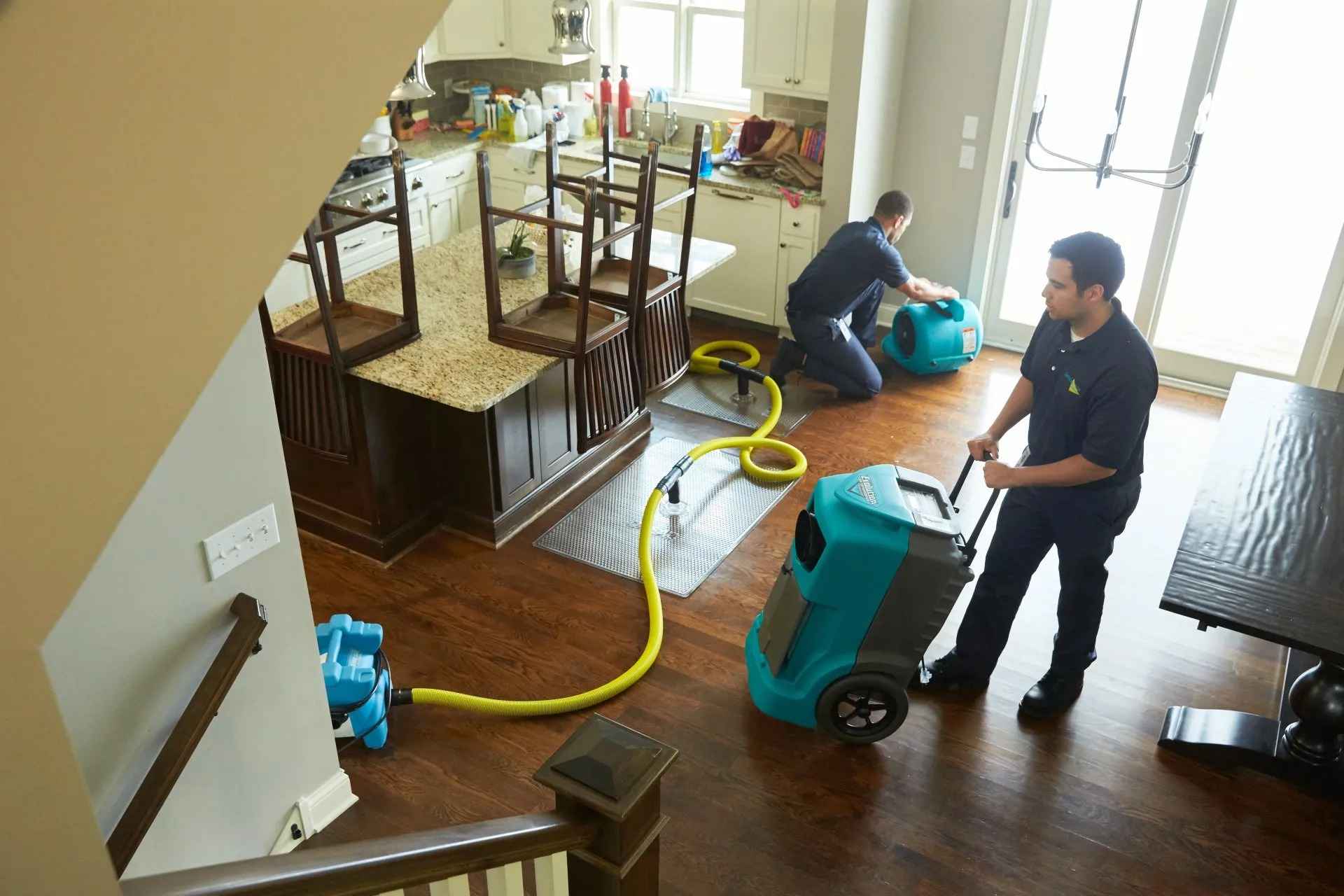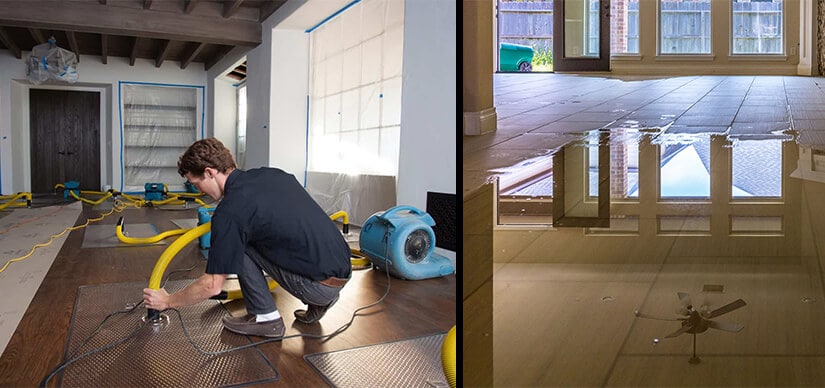Water Damage Restoration 101: Comprehending the Process and Price
Water damage can strike all of a sudden, leaving property owners in a state of confusion. Comprehending the remediation procedure is necessary for effective recovery. From evaluating the damage to picking the right solution copyright, each step impacts the total result and price. Aspects such as the kind of water damage and urgency also play a substantial role. What are the certain methods made use of in repair, and how can one get ready for possible expenditures?
Kinds Of Water Damage

Initial Evaluation and Inspection

Water Extraction Strategies
Following the preliminary assessment, effective water extraction strategies are used to mitigate damage and prevent more concerns. These methods entail making use of customized tools such as industrial-grade vacuum cleaners and submersible pumps - Water Damage Restoration. The option of method depends upon the volume of water present and the sort of materials impacted. For standing water, completely submersible pumps are normally utilized for quick removal, while vacuum cleaners are ideal for drawing out water from rugs and upholstery. Additionally, progressed techniques like water removal mats might be utilized for hard-to-reach locations - Flood Cleanup Services. The objective is to eliminate as much water as possible, reducing the possibility for mold and mildew growth and structural damage. Prompt and reliable water removal is crucial in the general water damage repair procedure
Drying and Dehumidification Process
Once the water extraction is total, the drying and dehumidification procedure ends up being crucial to bring back the afflicted location. This phase usually uses industrial-grade dehumidifiers and air moving companies to effectively reduce dampness degrees. The dehumidifiers reel in moist air, removing excess humidity, while air movers flow air to accelerate evaporation. Surveillance tools is frequently made use of to track humidity and temperature level levels, making certain optimal drying out conditions. The duration of this process can vary depending upon the extent of the water damage and ecological variables. It is vital to completely completely dry all affected products, consisting of walls, flooring, and furnishings, to stop mold development and architectural damage. Appropriate execution of this step is crucial for an effective reconstruction result.
Cleaning Up and Sterilizing Damaged Areas
As soon as the drying out process is total, an extensive first assessment and assessment of affected areas is important to determine contamination degrees. Efficient cleansing techniques and ideal items should after that be employed to eliminate debris and discolorations. Sanitization and disinfection techniques are crucial to assure that hazardous microorganisms are gotten rid of, restoring the area to a safe problem.
Preliminary Evaluation and Examination
Prior to starting any repair initiatives, a comprehensive preliminary evaluation and evaluation of the affected areas are essential for effective cleansing and disinfecting. This procedure involves identifying the level of water damage, determining the source of the water intrusion, and assessing the materials impacted. Inspectors normally search for indicators of mold growth, structural stability problems, and harmed items. The assessment additionally consists of checking wetness degrees making use of specific devices to guarantee no covert water pockets continue to be, as these can bring about more complications. Recording the findings is crucial for preparing the next action in the remediation process. A detailed preliminary assessment enables restoration specialists to create a targeted method for efficient cleansing and sterilizing, inevitably lessening damage and wellness threats.
Cleaning Methods and Products
Reliable cleansing and sterilizing of water-damaged areas need a range of products and methods customized to the certain materials influenced. For porous surface areas like drywall and carpeting, removal techniques are important to remove excess wetness, followed by deep cleaning with specialized detergents. Non-porous materials such as tile or steel can be cleaned up making use of commercial-grade cleaners that efficiently remove contaminants. Vapor cleansing is another efficient method, especially for carpets and upholstery, as it uses heats to get rid of bacteria and mold (Flood Cleanup Services). Furthermore, environment-friendly products are significantly popular for their security and efficiency - Water Damage Restoration. Ultimately, picking the suitable cleansing approaches and items not just assures immediate cleanliness yet also aids in protecting against more damage and wellness hazards related to water breach
Sanitization and Disinfection Techniques
When attending to water damage, proper sanitization and sanitation techniques are necessary to assure the security and wellness of the damaged environment. After first cleansing, surfaces should be treated with suitable anti-bacterials to remove pathogens, mold, and germs that flourish in moist conditions. Typical approaches consist of using EPA-approved chemical disinfectants, which can be applied through spraying or cleaning techniques. In addition, ultraviolet (UV) light systems can successfully sanitize areas by reducing the effects of microbes without severe chemicals. The selection of technique often depends upon the kind of products affected and the level of contamination. Inevitably, complete sanitization not only restores a risk-free space however additionally helps stop future wellness risks related to remaining wetness and mold and mildew development.

Repairs and Restoration Options
Assessing the damage triggered by water exposure is crucial for establishing the ideal repairs and repair alternatives. Home owners might encounter numerous problems, including harmed drywall, deformed floor covering, and compromised architectural elements. Relying on the level of the damage, repairs may include changing sections of drywall, setting up new floor covering, or enhancing structural beams. In situations of severe damage, complete replacement of damaged products may be needed. Furthermore, professional conservators usually advise making use of dampness meters to analyze surprise dampness degrees prior to determining on the most effective program of action. It is essential to act quickly to avoid mold development and further deterioration. Selecting the best alternatives not just restores the residential or commercial property but also ensures lasting safety and performance.
Factors Influencing Restoration Costs

The extent of water damage directly affects the remediation costs property owners can anticipate to sustain. Factors such as the source of the water, the duration of exposure, and the afflicted products considerably influence pricing. Tidy water damage from a damaged pipeline is typically much less pricey to bring back contrasted to damage triggered by sewer. Furthermore, the degree of contamination determines the need for specialized look at this now cleaning and disposal services, additionally enhancing expenditures. Geographical area likewise plays a function, as local labor prices and schedule of remediation solutions can differ. Finally, the urgency of the reaction impacts prices; quicker interventions generally bring about decrease overall expenses by avoiding additional damage. Recognizing these variables is essential for home owners when estimating remediation prices.
The 3 key kinds of water damage are classified based on contamination degrees: clean water, gray water, and black water. An extensive preliminary assessment and assessment are vital actions in the water damage remediation procedure. For standing water, submersible pumps are commonly made use of for fast elimination, while vacuums are perfect for drawing out water from carpets and furniture. The extent of water damage straight impacts the remediation costs homeowners can anticipate to incur. Tidy water damage from a damaged pipeline is typically less pricey to recover compared to damage caused by sewer.